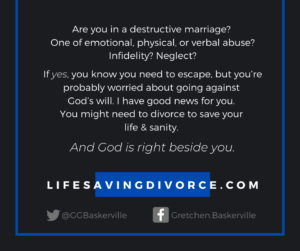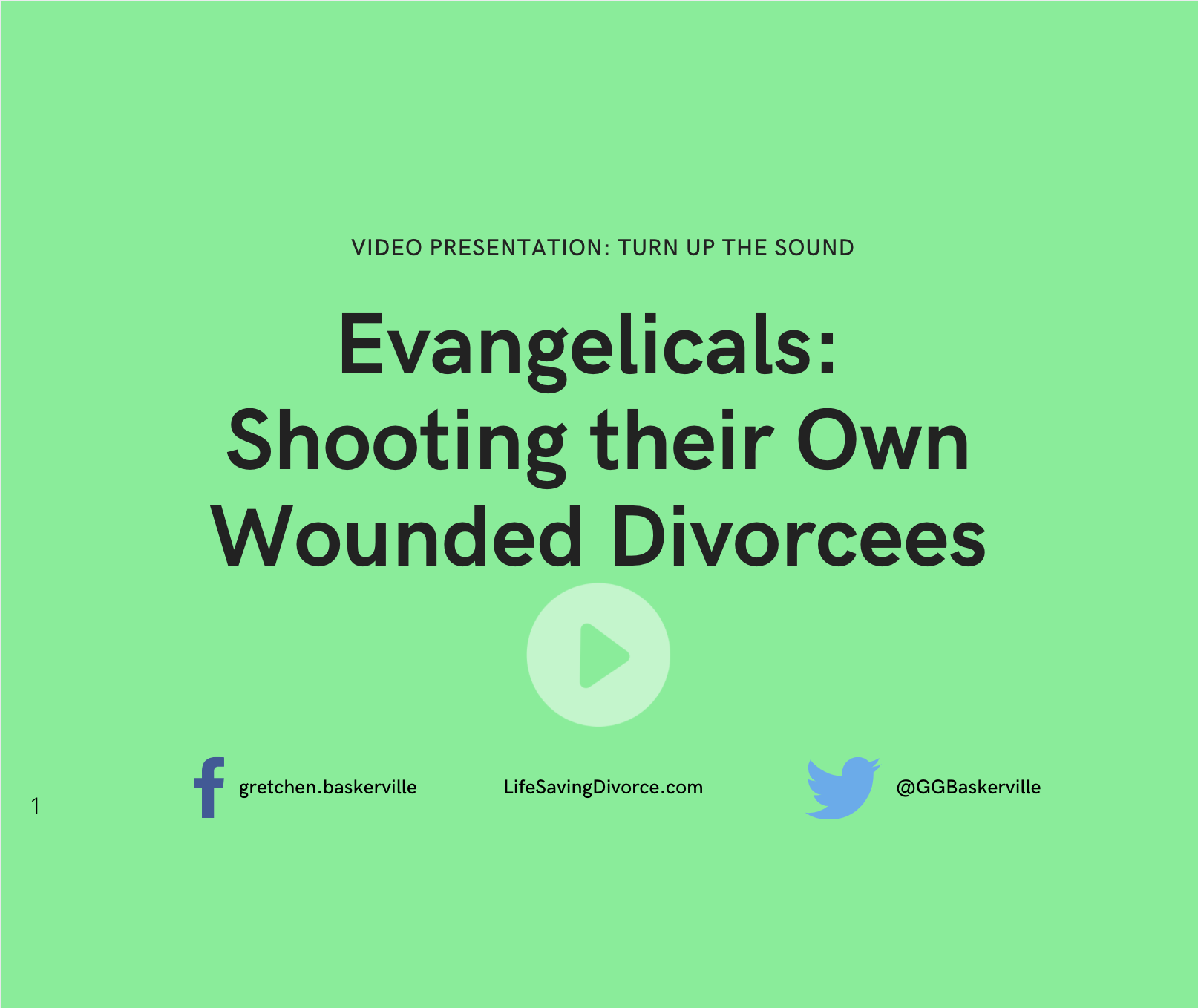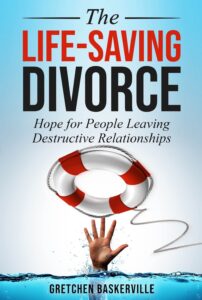VIDEO and TRANSCRIPT: Evangelicals Shooting their Own Wounded Divorcees (Closed Captioned)
My edits after the video transcript are in [brackets].
Hello, my name is Gretchen Baskerville and for the past 20 years I’ve been a Christian divorce recovery leader in evangelical churches in the Los Angeles area.
And today I want to talk with you, my fellow Christian divorcees, about something that’s been on my heart for a long time.
Why do our evangelical churches shoot their own wounded… their own divorced people who love the Lord, like you and like me.
And then they treat us like second-class citizens with the message that somehow, we’re to blame. Somehow, we could have [magically made our marriages good or safe, single-handedly]. Then I started asking myself how serious is this problem? Is it just my imagination or is it real? And if it’s real, can we measure it?
So who am I, and why do I care? Well, I’m an evangelical who was brought up in a godly Christian home to devout parents [who’ve been happily married 60 years and counting].
I attend an Evangelical church. I tithe. I volunteer. I serve. I do everything from leading Bible studies to serving meals to our homeless friends and preaching the gospel in the local women’s jail. I earned a Bible degree from Wheaton College.
But second, 25 years ago I needed a life-saving divorce myself, and since then I’ve led divorce recovery ministries and evangelical churches for 20 years
I have learned that nearly half of divorces are what I call life-saving divorces those divorces that are due to a pattern of violence unfaithfulness destruction and sinful behavior. And I can give evidence for that. Link: www.lifesavingdivorce.com/what-is-a-life-saving-divorce/
I’ve written a book about it.
So why do evangelical churches shoot their own wounded, their own divorced church members? We’re talking about divorce people who really love the Lord people like you and me.
Well, it’s interesting. Many church leaders and marriage book authors and Christian radio programs stigmatize us as second-class citizens, with the message that somehow we are quitters who took the easy way out by getting divorced.
How serious is this problem? Is it mainly an evangelical problem? How many godly divorcees leave the church? And [if so], can we even measure it?
Well, a fascinating article from Christianity Today answered my question back in February of 2020
The headline was, “Despite Stigma, More Divorced Evangelicals Are Going to Church.” As an Evangelical, I think that’s good news.
A lot of divorce evangelicals, about 2 out of 3, have found a church they like and attend nearly weekly. So we can probably assume that 2 in 3 feel safe and accepted in their evangelical church.
But can we measure what percentage of divorced evangelicals don’t attend evangelical churches? [Is it a high percentage? Yes!] What is the attendance gap?
If you look at this graph, (this is a graph that was at the bottom of the article in my last slide), it shows church attendance by religious tradition and marital status, so it’s showing us evangelicalism churches mainline churches black Protestant churches and Catholic churches.
The blue [dashed] line is the [percentage of] married people. The orange line is [the percentage of] divorced or separated people. [We could discuss a variety of topics based on this graph, but today, we’re focusing on the ovals in blue.]
So if you look, you’ll see a bunch of ovals. Let’s talk about those ovals. The ovals are the gaps. The gaps show us whether [similar proportions of] divorcees and marrieds attend at the same ratio. We’re not talking about numbers, we’re talking about ratios: percentages of all married evangelicals and percentages of all divorced evangelicals who were surveyed.
The big gap shown by a Big Blue Oval indicates that a high proportion of married evangelicals attend evangelical churches, but a much lower proportion of evangelical divorcees attend.
[Look at the] small gap, the small Blue Ovals, which you’ll see with the Mainline, Black Protestant, and Catholic groups. [Small ovals] mean that a similar proportion of their married and their divorcees attend. [The smaller the oval, the better, at least for the purposes of this discussion.]
So what I’m trying to point out is this big gap— that Big Blue Oval —shows that evangelical churches are [doing a terrible job] with the with evangelical divorcees. [A high percentage of] Evangelical divorces feel stigmatized and unwelcome there, at least in my opinion.
So why does such a low percentage of evangelical divorces attend evangelical churches [weekly]?
We know that half of divorces are for serious problems, a pattern of sexual immorality, domestic violence, verbal abuse, substance abuse or addictions, pedophilia, etc.
Yet evangelical divorce-bashing sermons push innocent evangelical divorcees away, especially the victims of abuse. [That’s] because evangelical [leaders] are divided on whether abuse is grounds for divorce. Three in four [Protestant] pastors say “yes” to physical abuse [as an acceptable reason for a Christian to divorce], but the majority say “no” to emotional, verbal or mental abuse.
And sadly, about one-in-five Protestant pastors say no to divorce for any reason at all. Even infidelity [or domestic violence], according to a Lifeway study in 2015.
What this means is that evangelical churches are not safe for abuse victims as long as they look down on all divorcees.
If one in three (or in the best case scenario one in four) evangelicals have ever been divorced, according to Barna Group in 2008, I would estimate evangelicalism has lost about 1 million weekly church attenders due to this problem of shooting our own wounded.
In other words, if evangelical churches stopped broad-brushing all divorce as something only quitters do, a million Christian divorcees might come back to church to attend to serve and to give. [However, for many, the spiritual abuse has been so severe, they prefer to practice their faith outside the 4 walls of a church.]
Let’s talk about examples of stigmatizing statements. And by the way, both of these are real.
Number one, “If you walk away for your marriage you’re walking away from Jesus.” The implication is that you will lose your salvation if you divorce. If true, then divorce becomes the unpardonable sin and all who divorce are going to hell. One of the women in my divorce recovery groups heard this sermon [and called me that afternoon].
“In the sermon,” she said, “the pastor repeated this phrase five times with no explanations, no caveats. If I hadn’t been going to one of your divorce recovery groups, I would be lying on the floor, curled up in fetal position sucking my fingers. Thank you for telling me [this isn’t true].”
Let’s look at the second example. “Divorce never makes anything better. It just gives you different problems.” Yes, a real pastor said that, and he wasn’t a young pastor, he was a seasoned pastor.
This statement implies that divorcees want the easy way out [and haven’t calculated the cost]. But in reality, we know nearly half of divorces are to get to safety from long term abuse or infidelity or drug and alcohol addictions. These divorcees want relief from fear and anxiety, not a new spouse. [This paragraph fixes an error in the video.]
Let’s look at some of these messages. These myths of divorce that we hear from the pulpit and from other places. These messages indeed may be true for immature people but not for committed Christians who sacrificed over and over to save their marriage. Let’s look at these messages.
- You didn’t try hard enough. Oh, yes, we did.
- You didn’t value the sanctity of marriage. Of course, we did, or wouldn’t have gone back [into a toxic situation, risking our wellbeing] over and over
- You didn’t have the dedication to make a marriage work like the rest of us. Well, you just didn’t have the same problems we did. [Don’t criticize until you’ve walked in our shoes.]
- You didn’t obey Jesus teaching about forgiveness. Oh, no, no. We forgave 70 times 7. We went the extra mile over and over.
- Divorce is the unpardonable sin. No, sorry. The Bible never says that.
- It takes “two to tango” or “all marriage problems are 50/50.” No, I’m sorry. Some spouses have severe personality disorders [mental issues or substance abuse] and they’re very destructive.
- You’re not perfect either. Well, frankly. Nobody’s perfect. But some people are doing sinful, marriage-endangering behaviors that are destroying their spouse and their children. [If only perfect people could object to criminal behavior, our society would be in chaos.]
- You didn’t give him enough sex. Well, experts know that it doesn’t matter how much sex you give to a pedophile or to a porn addict or to a cheater. It won’t fix them.
- Your kids will be destroyed if you divorce. That’s not true either. About 8 in 10 kids come out just fine with no serious emotional, psychological, or social problems after divorce.
- Your marriage would be healed, if you prayed more. I’m sorry, most of us prayed and fasted and begged God for years to fix our marriages. [God doesn’t force people to behave well. And sometimes he answers prayer by giving us the courage to leave.]
- It’s God’s will for you to suffer quietly in your marriage. No, it’s not. The Bible doesn’t say that we should suffer quietly in marriages and allow treacherous spouses to walk all over us.
- Divorce “shatters the image of Christ and the church.” No! How is that even possible? Nothing can destroy Christ in the church.
- Marriage is God’s best way to mature you. No, sorry, who’s ever done a study on that? Marriage is just one way that God uses to mature us, but God can use singleness to mature us. He can use all manner of things to a mature us, including being in the workforce, [being a parent, caring for a sick relative], being in leadership.
- If you stay, you just might save your spouse. No! In 1 Corinthians 7 [fixed error in video] the Apostle Paul clearly says that you shouldn’t count on being able to save your spouse.
- You can’t divorce, because they can’t help themselves, they don’t know any better. Well, just because they don’t realize what they’re doing, or how much it hurts you, or maybe they aren’t intentionally being abusive doesn’t mean you can’t get away to safety. In fact, you need to exercise your God given sense of self protection to get to a safe place and get away from an abuser, no matter what their motivation.
So who promotes and repeats these myths?
I would suggest four different types of people and organizations do.
- Well-meaning but ill-informed pastors and churches stigmatize divorcees as quitters who wanted to take the easy way out, which [identifies divorcees as “bad guys” and makes] our church fellowships unsafe [for us!].
- Some Christian marriage authors pretend that a pattern of abuse or adultery could never happen in Christian marriages and if it did, it would be easy to fix, if you were just a little less selfish had more sex prayed more submitted and learned communication skills.
- Then there are the Christian radio programs like Focus on the Family. The perpetuate dangerous myths on their website, even though many of their radio guests acknowledge that abuse is serious.
- Finally, there are the marriage-at-any-cost policy organizations they pretend to be fair and unbiased researchers. They show graphs and studies and they likely have the words “institute” or “research” or “studies” in their name, but they’ve got an agenda.
Their agenda is to scare people by
- [Presenting data in a way that exaggerates] the negative effects of divorce
- Making marriage sound like the magic ticket to a perfect life and
- Rarely, if ever, admitting that half of divorce is due to horrible problems and that getting kids out is vital to their health and wellbeing. [In fact, I’ve never seen an article from any of these organizations showing that nearly half of divorces are for infidelity, abuse, or drug/alcohol addictions, despite there being a lot of such studies. If you see one, please send me a link.]
Let me give you an example of one of these studies from a marriage-at-any-cost organization.
Here’s an example of exaggeration that stigmatizes divorcees and their kids. Look at this graph. [These data are correct, but the way of presenting them is a problem.]
This is a graph of “Students Ever Suspended or Expelled by Family Type.” The blue line is married birth parents [two-parent birth family].
And the pink line is separated or divorced moms. So those are the single moms. If you look down at the green line, that’s birth dads, only so single dads. So single dads and single moms are about the same level.
This graph looks really scary. It looks like kids from divorced homes are a lot more likely to be suspended or expelled from school. But look at the scale on the graph! It only goes up to 16%. [It’s a zoomed in view.] What if we saw this graph more realistically, say at 100% not at 16%.
Here we go, this is how it looks at 100%. Wow, hardly any kids from any type of family get expelled or suspended, it’s not so scary, after all.
- Only 5 in 100 kids from married birth parent families ever got suspended or expelled.
- Only 8 in 100 kids from separated or divorced mom families ever got suspended or expelled (same thing for single-dad families).
So don’t let marriage-at-any-cost organizations mislead you [by how they present these data].
Now let’s talk about how to identify a safe church.
Number one: A safe church listens to the painful stories from devout Christians who had to divorce. They show empathy not judgment, defensiveness, or [do interrogations].
Number two: A safe Church has leaders who change the narrative and educate others that half of divorces are for life-saving reasons. They stop making it sound as if all divorces are the fault of the person who filed.
Number three: a safe church retrains its leaders to stop giving false messages about divorce and divorcees.
Number four: A safe church has a divorce recovery group that does not shame people for getting life-saving divorces, including [divorces for] emotional and financial abuse in addition to physical abuse, adultery, and sexual immorality. A safe church connects the innocent victim to someone who has walked in their shoes and can give them hope [that there’s life after divorce].
Number five: Leaders at a safe church tell women from the pulpit, that they should not put up with abuse or infidelity. It’s not enough to tell men that women must be told directly
Number six: Safe churches know the Bible allows life-saving divorces and the key Bible verses to weave into sermons on marriage. Safe churches admit that some Christian marriages are the opposite of safe and loving.
And Number seven: A safe church has a policy, public perhaps online, on the types of divorce that are condoned so the people attending their church now.
Now let me end with a blessing for you.
May the Lord bless you and your children may you hold your head high without shame for taking the steps to protect yourself and your kids.
May you grow closer to the Lord, who loves you and will never forsake you. May you know deep in your soul that God loves you. Really.
May you sense that his love is not limited to a church building and his Holy Spirit is with you now, defending you from Satan the Accuser. You are loved and treasured. Nothing can separate you from the love of Christ, amen.
FREE!
If you would like to download a free copy of these tips, ”Seven Ways to End the Stigma of Divorce” just sign up at this link to receive an email that contains a link to download this free tip sheet at www.lifesavingdivorce.com/courage. Again, that’s www.lifesavingdivorce.com/courage. Thank you for listening to my presentation.
Popular blog posts.
For a discussion of the myth that a wife’s submission will automatically make her husband love her more, read THIS. Or the myth that being more sexually available will keep a husband from cheating or watching porn or molesting children, read THIS.
For first-person story of a woman: Adultery, prayer and the Bible, read THIS. Find out how the Lord set her free.
Audio interview: Shirley Fessel, author of Redemption from Biblical Battering tells her story of finding peace after divorcing an abusive husband HERE.
For Bible verses that show that every type of abuse qualifies as biblical grounds for divorce, see this overview of Bible verses online. For a chapter on all the key passages in the Bible on divorce, as well as the Jewish and Biblical background, see Chapter 6.
For a list of 5 types of abuse see HERE.
For a chapter giving examples of 150 examples of types of abuse (physical, emotional, sexual, financial, and neglect) and explaining the term “gaslighting,” along with many first-person stories, read Chapter 4 in the Life-Saving Divorce.
For a diagram of the Duluth Wheel of Power and Control and The Abuse Cycle, read Chapter 4.
For more on these 27 myths, read Chapter 3 in The Life-Saving Divorce. To see all 27 myths on one webpage click HERE
For a definition of life-saving divorces, read What is a Life-Saving Divorce?

For more on the myths of divorce, buy the Life-Saving Divorce.
As an Amazon Associate I earn from qualifying purchases.


